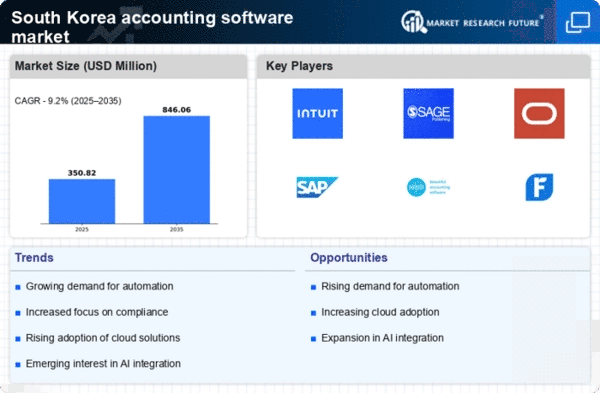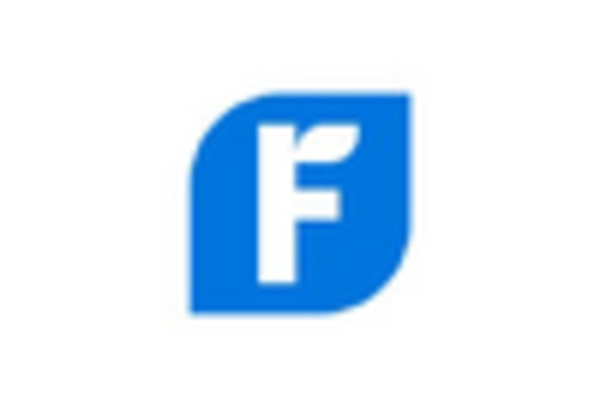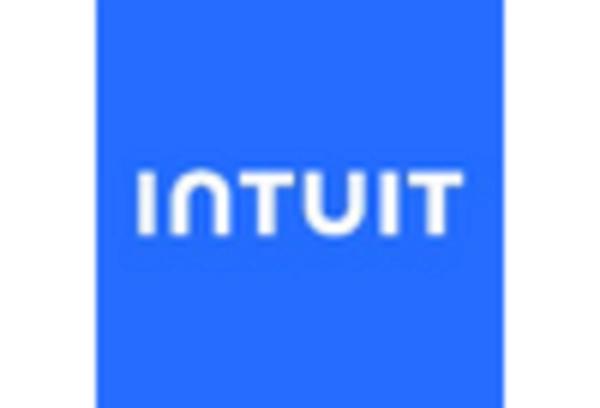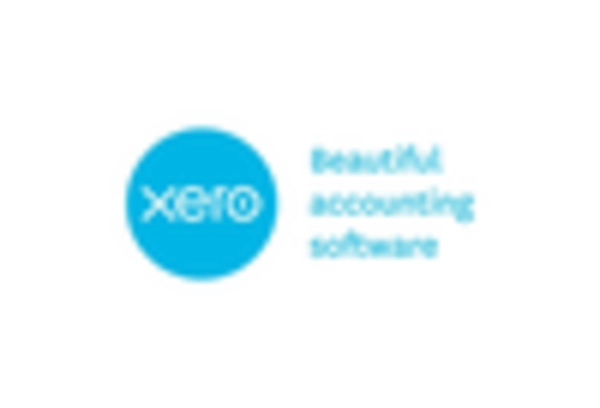Rising Focus on Cost Efficiency
Cost efficiency is emerging as a pivotal driver in the accounting software market in South Korea. Businesses are increasingly looking for solutions that not only streamline their accounting processes but also reduce operational costs. The pressure to maintain profitability in a competitive market has led many organizations to adopt software that automates routine tasks, thereby minimizing the need for extensive manual labor. Data suggests that companies that implement accounting software can reduce their accounting costs by up to 30%. This focus on cost reduction is prompting software providers to innovate and offer more affordable solutions without compromising on functionality. As a result, the accounting software market is likely to see a rise in demand for cost-effective solutions that deliver value to businesses.
Emphasis on User-Friendly Interfaces
The accounting software market in South Korea is increasingly characterized by a strong emphasis on user-friendly interfaces. As businesses seek to enhance productivity, the ease of use of accounting software has become a critical factor in the decision-making process. Companies are more inclined to adopt solutions that require minimal training and can be easily navigated by users with varying levels of technical expertise. Recent findings indicate that around 60% of businesses prioritize user experience when selecting accounting software. This trend is driving software developers to focus on creating intuitive designs that facilitate seamless interactions. Consequently, the demand for user-friendly accounting solutions is likely to shape the future landscape of the accounting software market, as organizations strive to empower their teams with tools that enhance efficiency.
Regulatory Changes and Compliance Needs
The accounting software market in South Korea is significantly influenced by evolving regulatory frameworks and compliance requirements. Recent changes in tax laws and financial reporting standards necessitate that businesses adopt accounting solutions that can easily adapt to these regulations. Companies are increasingly seeking software that not only ensures compliance but also simplifies the reporting process. It is estimated that around 70% of businesses in South Korea prioritize compliance features when selecting accounting software. This focus on regulatory adherence is driving innovation within the market, as software providers strive to offer solutions that meet the stringent demands of local regulations. Consequently, the ability to navigate complex compliance landscapes is becoming a critical driver for growth in the accounting software market.
Growing Demand for Real-Time Financial Insights
The accounting software market in South Korea is experiencing a notable surge in demand for real-time financial insights. Businesses are increasingly recognizing the necessity of having immediate access to financial data to make informed decisions. This trend is driven by the need for agility in a competitive landscape, where timely information can lead to better strategic planning. According to recent data, approximately 65% of small and medium-sized enterprises (SMEs) in South Korea are adopting accounting software that offers real-time reporting features. This shift not only enhances operational efficiency but also aligns with the broader trend of digital transformation within the accounting software market. As organizations seek to optimize their financial management processes, the demand for solutions that provide instant visibility into financial performance is likely to continue growing.
Increased Adoption of Mobile Accounting Solutions
The accounting software market in South Korea is witnessing a significant shift towards mobile accounting solutions. As the workforce becomes more mobile and remote work continues to be prevalent, businesses are increasingly seeking software that allows for on-the-go access to financial data. Recent surveys indicate that approximately 55% of companies in South Korea are now utilizing mobile accounting applications to manage their finances. This trend is indicative of a broader movement towards flexibility and convenience in financial management. Mobile solutions not only enhance productivity but also enable real-time collaboration among teams, which is essential in today’s fast-paced business environment. As the demand for mobile capabilities grows, software providers are likely to invest more in developing robust mobile platforms within the accounting software market.
















